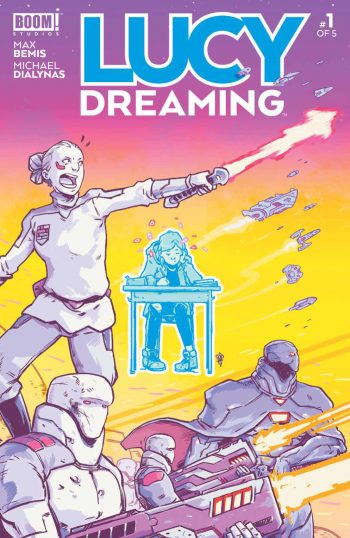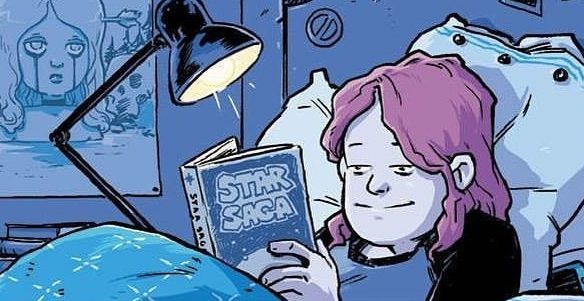Remember when you were a teenager and all you had in life was your books, your sarcasm, and crushingly low self-esteem about your soft torso? No? Come on, I can’t be the only one. Well, either way, they say it’s supposed to get better, that your school years are far from the best times of your life. For Lucy of BOOM! Studio’s Lucy Dreaming, it seems like it’ll never get better. That is, until she gets caught in an interstellar war, you know, like all of us do at one point or another. Made of teen dreams and mean queens, Lucy Dreaming is the comic for that insufferable teen angst inside of us and what happens when our world suddenly grows in leaps and bounds. While the comic does have perhaps the most annoying main character in existence, it also has a lot of fun with “the one” archetype while building a unique segue between the ‘real’ world and the ‘fantasy’ world.
Lucy Dreaming starts off with our main character Lucy, a girl who is addicted to her books and believes she’s intellectually superior to the people around her, despite never going out of her way to talk to anyone. As she slogs through her days monologuing about some sort of puberty-driven garbage, she one day notices her eyes turning yellow in the mirror. Confused but ultimately unworried, she goes on, only to awaken in a dream where she is suddenly the last stand in an intergalactic war, teetering between defeat and victory. Quickly things heat up and as the bodies begin to stack up, she’s finally convinced that she’s not actually dreaming, especially when her enemy is the only one who seems to understand her position. Will Lucy ever wake up from this nightmare or is she stuck fighting, like the dead man before her?
 Lucy Dreaming (get it, lucid dreaming? Hur hur hur) is a mixed bag for me. On one hand, I’m a sucker for a coming-of-age story that has fantasy or horror elements in it. I’m digging the outer space theme, especially how Lucy can travel in her dreams, and through alien violence, she quickly learns about life and endurance. Even this early in the comic, moral lines are already being crossed and lessons are being learned, especially since Lucy’s dream avatar is a grown-ass woman who has to deal with her partner’s eye-rolling attempts at flirting. I also love the mocking of standard sci-fi tropes: the rogue Han Solo, the tough-talking commander, the dark and evil warlord. They were obviously handled in a mocking fashion, at least at first, and make for a light read until the warlord reveals his true face. Then things get real. It’s a solid mix of laughs and shocks that are perfect for a finicky teen audience.
Lucy Dreaming (get it, lucid dreaming? Hur hur hur) is a mixed bag for me. On one hand, I’m a sucker for a coming-of-age story that has fantasy or horror elements in it. I’m digging the outer space theme, especially how Lucy can travel in her dreams, and through alien violence, she quickly learns about life and endurance. Even this early in the comic, moral lines are already being crossed and lessons are being learned, especially since Lucy’s dream avatar is a grown-ass woman who has to deal with her partner’s eye-rolling attempts at flirting. I also love the mocking of standard sci-fi tropes: the rogue Han Solo, the tough-talking commander, the dark and evil warlord. They were obviously handled in a mocking fashion, at least at first, and make for a light read until the warlord reveals his true face. Then things get real. It’s a solid mix of laughs and shocks that are perfect for a finicky teen audience.
Unfortunately, I already cannot stand the lead and I can’t tell if that was the point. At first, I found her attempts at ‘intellectual sparring’ and unnecessary angst to be kind of annoying. She’s as trope-full as the sci-fi elements with her over-the-top grumpy personality despite having both her parents and being an only child. I just can’t take her seriously. Perhaps it’s the bane of being an eternal 13 year old; you’re just going to hate everything and think you’re better than everyone. Which, as stated, makes me wonder if that wasn’t point of her character. Maybe I’m supposed to find her annoying and insufferable so when she has to start confronting the realities of the war, it’s more satisfying to watch her change herself for the better. I mean, this is a ‘coming-of-age’ story; the character needs to age out of something. But I just can’t tell if she’s that way on purpose or if the writer mistook her for a rounded-out character? I suppose the only way to find out is to keep reading.
Speaking of writing, the comic was written by Max Bemis, the singer of Say Anything. Though primarily a musician, Bemis has written for Marvel, Avatar, and Dynamite, along with BOOM! Studios fan-favorite comic Polarity. With so much expertise under his belt, he has a good eye for the journal-style writing that is heavily used in this comic, giving the reader a deep look into Lucy’s world through her own words. As stated, I don’t know how seriously we’re supposed to take the main character, but the ‘Dear Diary’ approach is a good way to introduce her and her world, both inside and out. Personally, I think it’s the art that really stands out. It’s fun and straddles the line between pop-art and true comic work, giving it a unique style all its own. I also enjoy how his shadow work isn’t simply just blobs of black shadows or scratchy, pencil shading, but cleverly placed colors that help give is his work depth, almost like a newspaper comic. It give everything a very cohesive look.
If you’re interested in some pretty alright teen sci-fi, look no further than Lucy Dreaming. Just try to look past the main character for now.
